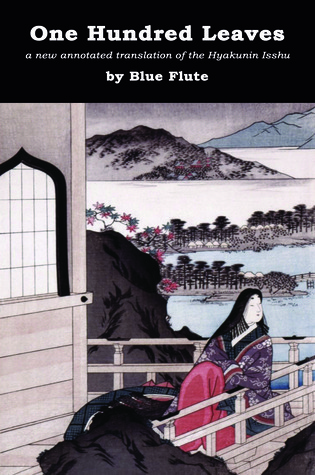More on this book
Community
Kindle Notes & Highlights
by
Blue Flute
Read between
September 29 - October 2, 2021
These poems, originally called waka, are now commonly called tanka and follow a syllable pattern of five lines, 31 syllables, broken into units of 5 / 7 / 5 / 7 / 7.
Educated nobility were generally expected to compose poems for a variety of social occasions and there were frequent poetry contests at the Imperial Court.
As Japanese writing developed from Chinese characters, which are essentially pictures that convey abstract concepts, it developed a strong visual orientation. Waka tend to focus on just one or two images to convey a strong meaning. Emotions and abstract ideas are commonly symbolized through tangible images.
Pillow words are those that do not necessarily have a literal meaning associated with the theme of the poem, but are a kind of stock phrase that readers of the time would associate with a certain theme. For example, “high sands” is associated with mountain summits and “black hair” is associated with disordered, confused, or tangled feelings.
Nature is very important in Japanese culture, even to the present day. Part of this relates to the traditional religion of Japan, Shinto, in which each element of nature has a deity.
#8 Monk Kisen, “My hermit hut” Translation By Monk Kisen My hermit hut Above the capital, I live with just a deer— The world a mountain house And the people, abandoned.
#12 Monk Henjou, “I see a maiden’s form” Translation By Monk Henjou (816-890) Heavenly wind, The cloud’s commute, Stop your blowing, please— I see a maiden’s form And want to stay awhile.
#13 Retired Emperor Youzei, “Male and female peaks” Translation By Retired Emperor Youzei (869-949) From Tsukuba’s Male and female peaks The Minano River falls And gathers a pool Of passion deep
#16 Ariwara no Yukihira, “I’ll return soon, or die trying” Translation By Counselor Yukihira, Ariwara no Yukihira (818-893) We stand apart From pines that spring Along Inaba’s peak— But if I hear your pining song, I’ll come back soon, or die trying.
#21 Monk Sosei, “Coming soon” Translation By Monk Sosei (died ~ 910) Just because you said “Coming soon” I’ve hung around waiting Through the longest night’s Morning moon
#23 Ooe no Chisato, “When looking at the moon” Translation By Ooe no Chisato (active ~ 883-903) When looking at the moon A thousand things Become sadness— My autumn alone Though it is not.
#24 Sugawara no Michizane, “I cannot make an offering” Translation By Kan Ke, Sugawara no Michizane (845-903) On this occasion, I cannot make an offering: So I pray that Offering Hill’s Fine brocade of colored leaves Finds mercy with the gods
All have withered and died.
#30 Mibu no Tadamine, “The cold dawn” Translation By Mibu no Tadamine (860-920) Cold dawn, A waning moon With no companion— Since our parting, nothing is so loveless As the break of day.
#33 Ki no Tomonori, “Scattered blossoms” Translation By Ki no Tomonori (845-907) Eternal moon And fading light— This spring day, A restless heart And scattered blossoms
#34 Fujiwara no Okikaze, “Takasago’s ancient pines” Translation By Fujiwara no Okikaze (active ~ 900-914) I wonder who My companion will be When old friends And even Takasago’s Ancient pines have disappeared
#38 Lady Ukon, "How I pity your fate" Translation By Lady Ukon (active ~ 960-966) Being forgotten, I do not worry for myself— You made a vow On your mortal life And how I pity your fate.
#40 Taira no Kanemori, “Is something on your mind?” Translation By Taira no Kanemori (died in 991) Though I’ve concealed it, My color has shown A yearning passion— So she asked, “Is something on your mind?”
#42 Kiyohara no Motosuke, “You have made a pledge” Translation By Kiyohara no Motosuke (908-990) You have made a pledge On your sleeves, leaving mementos Wrung dry repeatedly— Yet the waves overran The Endless Mountain Pine.
#52 Fujiwara no Michinobu, “I curse the light of day” Translation By Courtier Fujiwara no Michinobu (972-994) It’s dawn and though I know The night’s love scene Will play again— I still curse The light of day
#56 Lady Izumi Shikibu, “All will be a memory” Translation By Lady Izumi Shikibu (976? – 1020) Soon, we will not be In this world together And all will be a memory: Now, for just a moment, How I wish to meet.
#63 Fujiwara no Michimasa, “Now that my love must die” Translation By Head Magistrate of the Left Michimasa, Fujiwara no Michimasa (992-1054) Now that Our love must die I only wish I could tell you Without a messenger
#65 Lady Sagami, “Bitter grieving” Translation By Lady Sagami (998-1061) Bitter grieving And my sleeves will not dry— But the rot Of our love is not so bad As that of my name.
#67 Lady Suou no Naishi, “How regrettable it would be” Translation By Lady Suou no Naishi (1037-1109) On a short spring night To rest amid your arms Is but a dream— How regrettable it would be To ruin my name so pointlessly.
#75 Fujiwara no Mototoshi, “This year too shall pass” Translation By Fujiwara no Mototoshi (1060-1142) You made a pledge With life like dew Upon a plant: Alas, another autumn And this year too shall pass
#80 Lady Horikawa, “My hair and feelings are both in tangles” Translation By Empress Dowager Taiken, Lady Horikawa (active ~ 1142) I do not know The constancy of his heart— And this morning My hair and feelings Are both in tangles
#99 Retired Emperor Gotoba, “I am weary” Translation Poem by Retired Emperor Gotoba (1180-1239) I pity some And curse the others The flavor’s gone The worldly cares And I am weary


